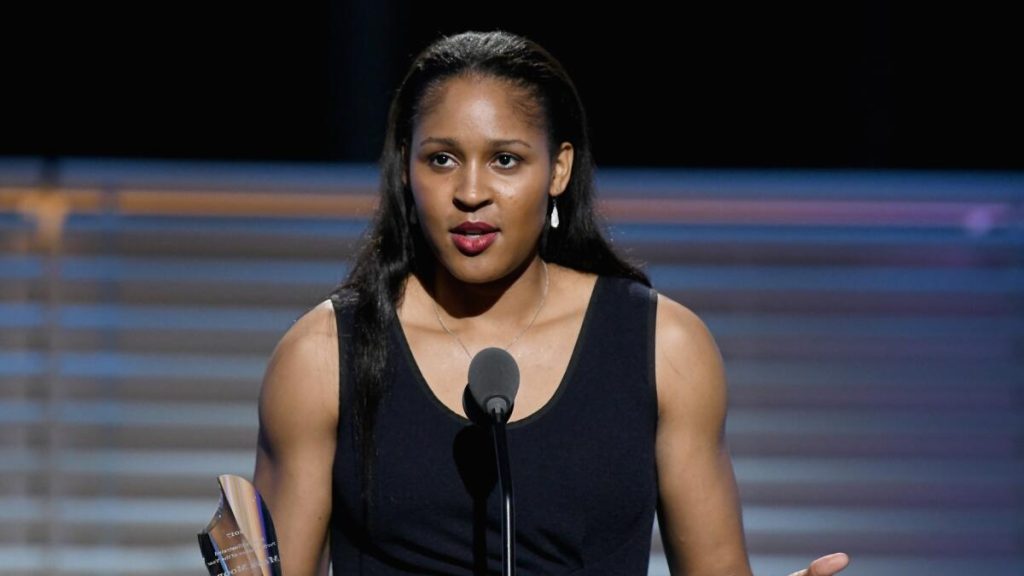Maya Moore Siblings: All About Ashley and Olivia Dabney

Former WNBA player Maya Moore PHOTO/Sports Illustrated
Maya Moore is a name synonymous with excellence in women’s basketball and a powerful voice for social justice.
Born on June 11, 1989, in Jefferson City, Missouri, Moore grew up in Atlanta, Georgia, where her passion for basketball blossomed.
She rose to prominence as one of the greatest players in the history of the Women’s National Basketball Association (WNBA) and became equally known for her decision to step away from the sport at the peak of her career to focus on criminal justice reform.
Moore’s early life was shaped by her mother, Kathryn Moore, who raised her as a single parent, nurturing Maya’s love for basketball.
Siblings
Maya has two half-sisters, Ashley Dabney and Olivia Dabney. Ashley was a track and field athlete at Towson University, while Olivia played basketball at Rutgers Preparatory School and later for the Sacred Heart Pioneers.
Maya Moore’s father, Mike Dabney, is not her primary caregiver; she was raised by her mother, Kathryn Moore.
Despite her family background, Maya has achieved significant success in her basketball career, becoming one of the most celebrated players in the WNBA.
Career
Moore’s journey began at Collins Hill High School in Georgia, where she led her team to three state championships and earned national recognition as a top recruit.
She then attended the University of Connecticut (UConn), where she played under legendary coach Geno Auriemma.
At UConn, Moore became a cornerstone of the program’s dynasty, leading the Huskies to four consecutive Final Four appearances and two NCAA championships (2009 and 2010).
Also Read: Candace Parker Siblings: All About Anthony and Marcus Parker
She graduated in 2011 as one of the most decorated players in college basketball history, with accolades including two Naismith College Player of the Year awards (2009, 2011) and the record for most points scored in UConn history at the time.
In 2011, Moore was selected as the No. 1 overall pick in the WNBA Draft by the Minnesota Lynx, launching a professional career that would cement her status as a legend.
She quickly made an impact, earning the WNBA Rookie of the Year award in her debut season.
Over the next eight years, Moore led the Lynx to four WNBA championships (2011, 2013, 2015, 2017) and was named the league’s Most Valuable Player (MVP) twice (2013, 2014).
Known for her versatility, Moore excelled as a forward with an unparalleled combination of scoring, rebounding, and defensive prowess.
Her clutch performances earned her the nickname “Money Moore,” a nod to her ability to deliver in high-pressure moments.
Beyond the WNBA, Moore dominated in international play, winning two Olympic gold medals (2012, 2016) with Team USA and multiple titles in overseas leagues during the WNBA offseason.
Her trophy case also includes six All-Star selections, the 2017 WNBA Sportsmanship Award, and a spot on the WNBA’s 20th Anniversary Team in 2016.
In 2019, at the height of her career, Moore made a stunning announcement: she would step away from basketball to focus on advocating for criminal justice reform, particularly the case of Jonathan Irons, a man she believed had been wrongfully convicted.
Her efforts paid off in 2020 when Irons was released after more than two decades in prison.
Moore’s activism showcased her willingness to sacrifice personal glory for a greater cause, earning her widespread admiration.
She married Irons in 2020, and though she returned briefly to the court in 2021, she officially retired in 2023, leaving behind a legacy as one of the game’s all-time greats.
